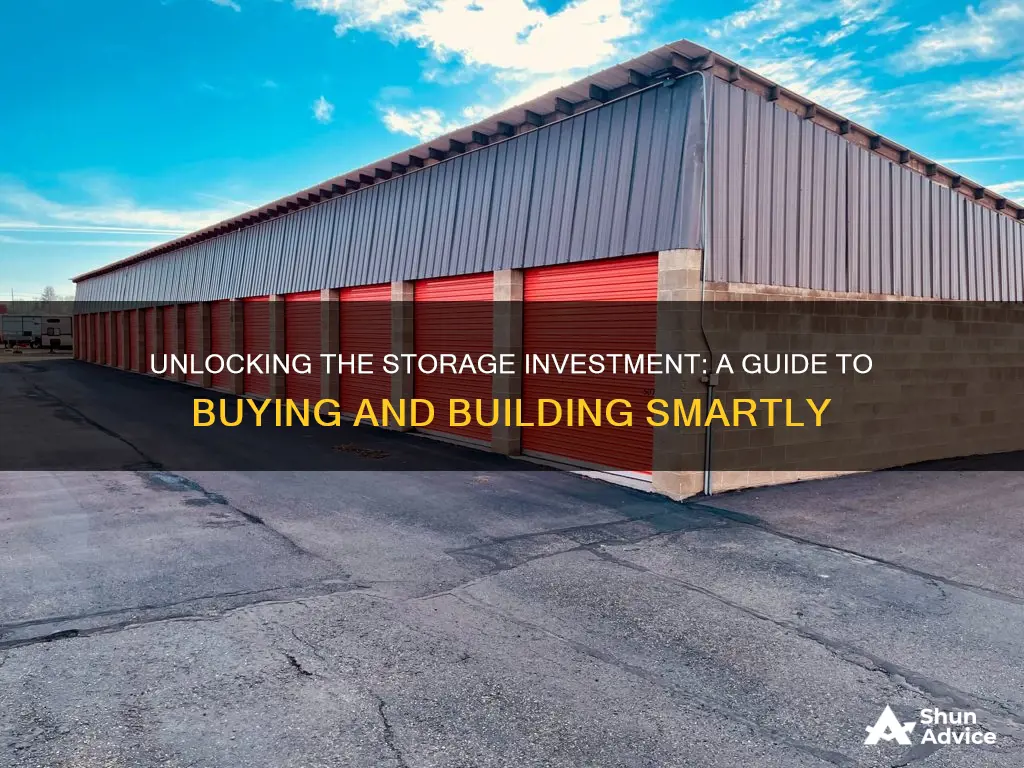
Investing in self-storage facilities is a great way to diversify your portfolio and generate a stable passive income. Self-storage is a lucrative business with a high profit margin and low operating costs. It is also resilient during economic downturns and has a growing demand from individuals and businesses alike.
There are several ways to invest in self-storage, including purchasing shares in a Real Estate Investment Trust (REIT), buying an existing facility, or building one from scratch. When investing in self-storage, it is important to consider the location, market demand, and competition. Conducting thorough market research and financial analysis is crucial to making a successful investment.
Before investing, it is also essential to understand the different classes of self-storage facilities, ranging from Class A (newer, modern facilities) to Class C (older facilities with limited amenities). Additionally, active management is required even with self-storage management software in place.
Overall, investing in self-storage can be a profitable venture, but it requires careful consideration and planning to maximize returns and minimize risks.
| Characteristics | Values |
|---|---|
| Investment type | Self-storage facilities |
| Investment benefits | High earning potential, stable income stream, economic durability, flexible business model |
| Investment risks | Tricky market positioning, need for active management, risk of oversupply |
| Investment options | Purchase shares in a Real Estate Investment Trust (REIT), buy an existing facility, develop your own facility, invest in a self-storage syndicate |
| Self-storage types | Climate-controlled storage, drive-up & outdoor storage, vehicle storage |
| Self-storage classes | Class A (newly built, modern amenities), Class B (older, fewer amenities), Class C (oldest, limited amenities) |
| Self-storage customers | Individuals, small and medium-sized businesses, students, military personnel |
| Self-storage financing | Traditional mortgages, commercial loans, SBA loans, partnering with investors |
What You'll Learn
- Self-storage is a lucrative business with low operational costs, high profit margins, and stable income streams
- Self-storage facilities are cheaper to build than apartments/houses and require less maintenance
- Self-storage is a flexible business model that can be adapted to suit the needs of your customers
- Self-storage is a passive business income that performs well during economic downturns
- Self-storage is a good investment option for portfolio diversification

Self-storage is a lucrative business with low operational costs, high profit margins, and stable income streams
Self-storage is a lucrative business venture with several advantages over other types of businesses. Firstly, it has low operational costs. Self-storage facilities require less maintenance and upkeep compared to other commercial real estate, such as office buildings or multifamily complexes. They also have lower overhead costs, particularly in terms of labour. This makes it a great option for first-time business owners.
Secondly, self-storage businesses have high profit margins. The industry average sits at an impressive 41%, with revenue for the sector reaching $39.5 billion in 2022 in the US alone. This is due to the high demand for storage space, with 38% of Americans having rented a self-storage unit or planning to do so. This demand is driven by factors such as economic growth, increasing household income and size, and population growth.
Additionally, self-storage businesses offer stable income streams. They are "fairly resilient through both economic booms and downturns", as people always seem to find a use for them. During good economic times, small businesses may use self-storage for short-term product warehousing, while individuals may use them for overflow items. In contrast, during economic downturns, people tend to downsize and move sentimental items and excess furniture into self-storage. This makes self-storage a great way to diversify your investment portfolio.
Moreover, self-storage businesses have low capital expenditures, making it easier to maintain cash flow even during challenging economic periods. They are also less costly to construct compared to other types of commercial buildings, with small to mid-sized facilities typically ranging from $200,000 to $500,000. This makes it a more accessible investment opportunity, even for those with limited funds.
Finally, self-storage businesses provide opportunities for additional income streams. Aside from renting out storage units, owners can sell locks, cardboard boxes, packing tape, insurance, and other products and services. This helps to maximise profits and diversify revenue streams.
Retirement Strategies: Exploring Five Smart Investment Options
You may want to see also

Self-storage facilities are cheaper to build than apartments/houses and require less maintenance
Self-storage facilities are an increasingly popular investment choice, especially for those looking to diversify their portfolios. They are cheaper to build than apartments or houses, requiring less upfront capital expenditure. In 2023, the national average for multifamily new construction was $350 per square foot, while a common self-storage facility costs between $90-$120 to build. This lower cost of construction means that self-storage can be a great option for those with a smaller budget.
In addition to lower construction costs, self-storage facilities also require less maintenance and have lower operational expenses. They are simple to oversee, with minor maintenance needs and no need for a massive operational staff. Many self-storage facilities are unmanned and can be run using online tools and access control security systems, further reducing staffing costs. This low-maintenance nature of self-storage facilities can free up time and resources for owners and investors, allowing them to focus on other aspects of their business or personal lives.
The flexibility of lease contracts in the self-storage industry also contributes to their lower maintenance requirements. Lease contracts can be adjusted monthly, allowing owners to modify prices to cater to the changing market demands. This flexibility is not typically seen in traditional real estate contracts, which are often long-term and less adaptable. The ability to change prices regularly can help owners keep their facilities competitive and profitable without incurring significant maintenance or renovation costs.
Furthermore, self-storage facilities often have lower maintenance costs because they do not require substantial construction on the property. Unlike rented apartments or houses, self-storage units do not need to be constantly updated or renovated to meet the needs of tenants. As long as the units are secure and functional, there is little need for extensive construction or remodelling. This results in significant cost savings for owners, making self-storage a more financially attractive investment option.
Overall, self-storage facilities offer a unique opportunity for investors with their lower construction and maintenance costs. They provide a resilient and profitable investment, especially in times of economic downturns when people may be downsizing or seeking additional storage solutions. By requiring less upfront capital and ongoing maintenance, self-storage facilities present a compelling choice for those looking to enter the real estate investment market or diversify their existing portfolios.
Planning for the Golden Years: Navigating Australia's Retirement Investment Landscape
You may want to see also

Self-storage is a flexible business model that can be adapted to suit the needs of your customers
The self-storage business model can be tailored to meet the specific needs of customers. For example, climate-controlled storage units are available to protect sensitive items from heat, cold, and humidity. Additionally, drive-up and outdoor storage options provide affordable and user-friendly solutions for individuals. Mixed-use storage facilities further showcase the flexibility of the business model, combining different services to cater to a wide range of customers in urban and industrial areas.
The self-storage industry's resilience through economic cycles is another testament to its flexibility. During boom periods, self-storage facilities may be used for short-term product warehousing or incubator spaces for small businesses. In contrast, during downturns, individuals may downsize their living spaces and rely on self-storage for sentimental items and excess furniture. This flexibility ensures that self-storage remains in demand regardless of economic conditions.
The ability to adapt to market demands and customer needs is a key strength of the self-storage business model. By understanding the target customer base and making informed decisions about unit types, locations, and additional services, self-storage businesses can thrive and meet the diverse and changing needs of their clientele.
The Mystery of Investment Returns: Unveiling the 'When' in Profitable Ventures
You may want to see also

Self-storage is a passive business income that performs well during economic downturns
Low Capital Expenditures and Maintenance
Self-storage facilities have low capital expenditures, which means expenses can be kept low, even during economic downturns. The maintenance costs are relatively low compared to other types of real estate investments. There are no tenants living in the property, so there are fewer maintenance issues such as broken toilets or pipes. This results in lower overall costs and less hassle for the owner.
High Demand and Continuous Growth
The demand for self-storage continues to grow due to various factors. People downsizing their homes, businesses requiring storage for inventory or equipment, and the increasing trend of online shopping all contribute to the high demand for self-storage. This demand is expected to continue, making self-storage a stable and reliable investment.
Flexible and Adaptable
Self-storage facilities offer flexibility in usage. During economic booms, they can be used for short-term product warehousing or incubator spaces. During downturns, people tend to downsize and need a place to store their excess furniture and sentimental items. This flexibility ensures a constant stream of customers, regardless of the economic climate.
Low-Risk Investment
The self-storage business has a low-risk profile due to its high profit margins and continuous demand. The industry is worth over $29 billion, with a profit margin of 41%. The lease contracts are also flexible, allowing owners to adjust prices monthly, which is an advantage over traditional real estate contracts.
Passive Income Potential
Self-storage can be a passive income source, requiring less hands-on management than other real estate ventures. With the right setup and technology, many tasks can be automated or outsourced. This passive approach can still generate substantial profits, as evidenced by successful investors like B. Wayne Hughes, who built a $2.8 billion fortune in self-storage.
In summary, self-storage is a resilient business that performs well during economic downturns due to its low costs, high demand, flexibility, and potential for passive income. It is a stable investment option that can provide steady returns, even during challenging economic periods.
Student Debt Strategies: Investing to Reduce the Burden
You may want to see also

Self-storage is a good investment option for portfolio diversification
Secondly, self-storage is a recession-resistant industry. It has proven to be resilient during economic downturns, as individuals and businesses seek cost-effective storage solutions. The demand for storage remains consistent, regardless of economic fluctuations, making it a reliable source of income.
Thirdly, self-storage facilities have lower risk factors compared to other commercial real estate investments. The demand for storage is consistent due to various life events such as moving, downsizing, or decluttering. Additionally, businesses frequently use self-storage for inventory, equipment, or documents. This sustained demand ensures high occupancy rates.
Furthermore, self-storage investing offers flexibility. Investors can start small with a single storage facility and gradually expand their portfolio based on market demand. It also allows for diversification, reducing the overall risk of an investment portfolio.
Lastly, self-storage facilities have lower competition compared to other types of real estate. This can result in higher occupancy rates and the ability to increase rental rates, providing higher returns on investment.
In conclusion, self-storage is a good investment option for portfolio diversification due to its stable cash flow, recession resistance, lower risk, flexibility, and potential for high returns.
Retirement Strategies: Navigating the Rebalancing Act
You may want to see also
Frequently asked questions
Self-storage facilities are a good investment because they are a stable, growing business with a high profit margin. They are also low-maintenance, and the lease contracts can be adjusted monthly, allowing you to change prices.
Clients can be demanding and unpredictable, and there is a lot of competition in the market. You will also need to invest in security systems and maintenance.
The cost varies depending on location, acquisition costs, land costs, and facility construction costs. You will also need to consider whether you will need to take out a loan, and whether you will need to hire staff to operate the facility.







